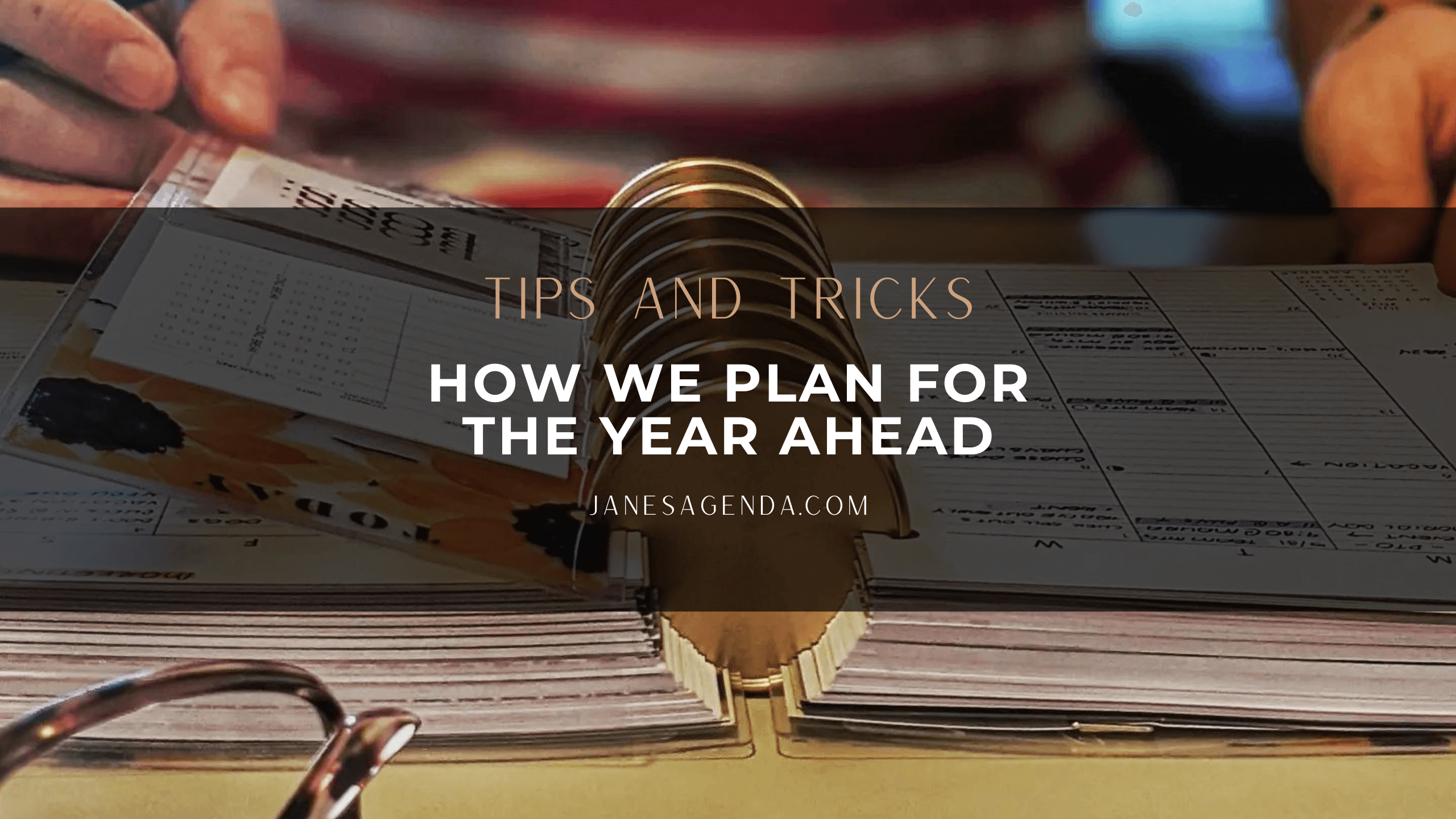How does a planner company plan for the year ahead? Strategically and with purpose.
Planning the year ahead can be daunting, especially when you have lots of different people's schedules to work into the mix. The format for how we plan our year can easily be repurposed to help you plan your life. Read on to see the steps we take to maintain order, be efficient, and make the most out of our year.

Step 1. Plan what matters first.
Plan a life you can't wait to wake up to.
When I started Jane's Agenda, I promised myself I would never miss an important life event and I made that rule for everyone who works for me. We schedule the life events and we work around them. Not the other way around.
As a team, we sit down and synchronize our planners regularly and when we plan a new year we take special care to plan what matters first. We call these "non-negotiables".
Non-negotiables:
- Employee vacations
- Holidays/PTO (Paid Time Off)
- Long weekends
- School vacations
- Birthdays, anniversaries, weddings, and other personal events
A special note. I spent many years working in retail. If I wanted to take a vacation in December, that wasn't happening. No way, no how. You won't always be able to plan personal events first, but whenever possible we recommend trying.

Step 2. Schedule work projects.
Items we schedule for work:
- Events, sales, releases.
- Meetings and trainings.
- Celebrations
We schedule out the dates of all of our work projects. If a work project happens to fall on the same day as an important personal event, we reschedule the work project, not the personal time (whenever possible). If you know your children are off school a certain week, don't schedule to launch a new product line that week.
Long weekends are so nice. We don't schedule anything important for the Friday before. No meetings, events, releases, trainings. Nothing. When you are excited to get three days off to spend time with your family, the last thing you want to do is work late the Friday before and go into the weekend stressed. We aim to have all big projects wrapped up on Thursday instead.
Step 3. Schedule the little things and your routine.
We look at each event and brainstorm what it would take to make it successful. Do you have certain tasks you know you'll need to do?
Plan in your regular routine as well. You know what time you have to drop your kid at the school bus, what day your trash gets picked up, and what day your rent needs to be paid. We schedule all of these as well. If something clashes with something else, we go ahead and plan on how to handle it. That might mean coming in late, scheduling to find a sitter, or rescheduling an appointment.
As an example - We have meetings every Monday at Jane's Agenda, if a Monday happens to be a non-work day, we move the meeting to Tuesday right away.

Step 4. We plan for the things that cannot be planned.
Sometimes there are things we cannot plan ahead. You might not be able to plan *every* detail of your child's birthday party six months out, so you schedule to plan it. Perhaps a month before the birthday, schedule a "Plan Johnny's Birthday" event. We do this with meetings about things we can't possibly know all the details ahead of time. Every quarter our JA leadership team has a planning day scheduled out just for this. In my personal life, I always spend the Sunday before each new month trying to fill out my schedule with anything new I know of.
Step 5. Plan for success.
- Overwhelm is not ok. Look at your schedule, look at the events, the tasks, and the workload. Ask yourself if you are being realistic about your time and abilities. Occasionally we will over-schedule. You can reduce your goal, schedule the event a different day (or month), or call in reinforcements. Perhaps you can even cancel the item completely.
- Plan for rest. We know that after an event, our team will be a little tired, so we don't plan anything else big for a couple weeks so we can get caught up on our regular work and feel prepared for the next event.
- Leave a buffer zone. You won't be able to schedule everything. Emergencies happen, family unexpectedly makes a visit, and a child may get sick. Life happens. Don't pack your schedule so full that you couldn't possibly flex it.
- Don't schedule necessary tasks for the last minute. If we have an event at Jane's Agenda that starts on Friday, we don't schedule the necessary tasks to be done on Thursday. We schedule them a week or two out so that if anything happens we know we have time.
Once you have the big picture for the year all planned out, you will feel more confident about your time. As items pop up, like scheduling a doctor's appointment or a child's school play, you'll look at your schedule and immediately know where you need to adjust.



